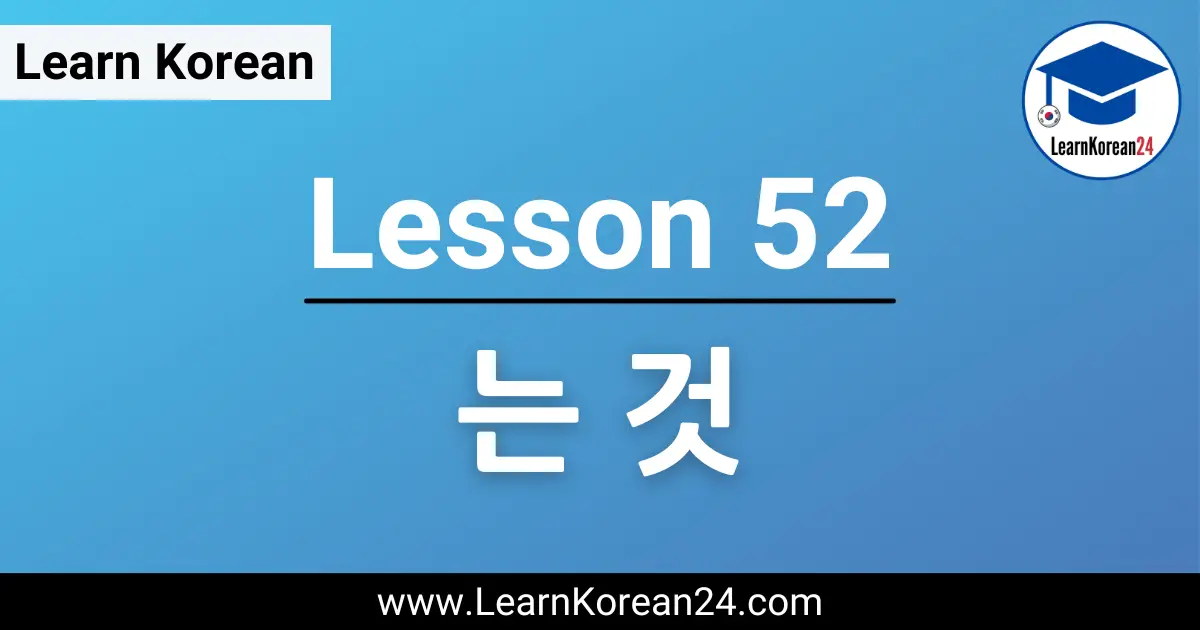Lesson 52: 는 것
In this lesson, you will learn how to change verbs into nouns using 는 것. This is similar to the ‘gerund’ form in English, which is a verb that is used as a noun. For example, consider the word ‘eating‘. In the sentence “I am eating.“, ‘eating‘ is a verb, whereas in the sentence “I like eating.“, ‘eating‘ is a noun (gerund). By the end of this lesson, you’ll be able to take any verb and change it into its noun form and use it in a variety of sentences.
Lesson 52: 는 것
는 것 is used to change verbs into nouns and is similar to the gerund form (-ing) in English. 는 것 is often used in written language, whereas in spoken language, the shorter 는 거 form is commonly used. Compared to 는 거, 는 것 sounds a little more formal. Here are some examples of verbs changed into nouns using 는 것:
타다 = to ride
타는 것 = riding (noun form)
저는 자전거 타는 것을 좋아해요. = I like riding a bike.
등산하다 = to hike
등산하는 것 = hiking (noun form)
저는 등산하는 것을 싫어해요. = I hate hiking.
걷다 = to walk
걷는 것 = walking (noun form)
다리가 아파서 걷는 것이 힘들어요. = My legs hurt, so walking is difficult.
보다 = to watch
보는 것 = watching (noun form)
영화를 보는 것은 제 취미예요. = Watching movies is my hobby.
Conjugation Rules
는 것 is attached to verbs only. There are no special conjugation rules with 는 것. Simply attach it to the verb stem (unless the verb is irregular – see table below).
| Conjugation Rule | Examples |
|---|---|
| Verb Stem Ends In Consonant / Vowel + 는 것 | 가다 (to go) → 가는 것 보다 (to see) → 보는 것 먹다 (to eat) → 먹는 것 공부하다 (to study) → 공부하는 것 |
| <Irregular Conjugations> | 살다 (to live) → 사는 것 열다 (to open) → 여는 것 팔다 (to sell) → 파는 것 만들다 (to make) → 만드는 것 |
Things To Note
In real conversations, when 는 것 is followed by the particles 이, 은 and 을, they are often contracted to 는 게, 는 건, and 는 걸.
다리가 아파서 걷는 것이 힘들어요. → 다리가 아파서 걷는 게 힘들어요.
= My legs hurt, so walking is difficult.
영화를 보는 것은 제 취미예요. → 영화를 보는 건 제 취미예요.
= Watching movies is my hobby.
저는 등산하는 것을 싫어해요. → 저는 등산하는 걸 싫어해요.
= I hate hiking.
Example Sentences
집이 멀어서 학교에 오는 거 힘들어요. = My house is far, so coming to school is difficult.
한국 드라마를 보는 거 좋아해요. = I like watching Korean dramas.
혼자 밥을 먹는 게 너무 심심해요. = Eating alone is so boring.
운동할 때 걷는 걸 좋아하지만 뛰는 걸 싫어해요. = When I exercise, I like walking, but I hate running.
취미가 뭐예요? = What’s your hobby?
제 취미는 그림을 그리는 거예요. = My hobby is drawing pictures.
오늘 저녁에 무슨 음식을 만들까요? = What shall we cook tonight?
불고기를 만드는 게 어때요? * = How about making bulgogi?
*는 게 어때요 means ‘How about ~?’ and is used to make a suggestion.


